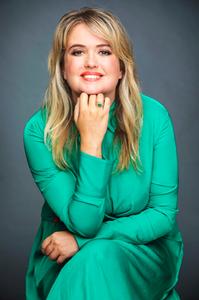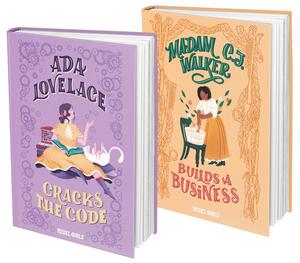
|
|
| photo: Colin Young-Wolff | |
Elena Favilli is the co-founder and CEO of Rebel Girls, which works to empower girls and women all over the world. She has worked for Colors magazine, McSweeney's, RAI, Il Post and La Repubblica, and managed digital newsrooms on both sides of the Atlantic. Favilli co-wrote, with Francesca Cavallo, Good Night Stories for Rebel Girls, which broke fund-raising records on Kickstarter. Ada Lovelace Cracks the Code and Madam C.J. Walker Builds a Business are now available from Rebel Girls. Favilli lives in Los Angeles with her dog Lafayette, a Bracco Italiano.
On your nightstand now:
I'm quickly making my way through Sapiens: A Brief History of Humankind by Yuval Noah Harari, recommended to me by multiple people. There's something very comforting about considering human evolution before sleeping. And Harari does a wonderful job explaining complex subjects--it truly reads like fiction.
Favorite book when you were a child:
Growing up in Tuscany, I read The Adventures of Pinocchio all the time. In fact, the author, Carlo Collodi, is originally from the same region. I was the only child in the small village I grew up in, so I relied on books to guide my adventures.
Your top five authors:
Cesare Pavese, a pillar of Italian contemporary culture. Joan Didion, because her writing made me more American and more adult. J.K. Rowling, for capturing the original magic of classic fairytales. Jane Austen for being a Rebel Girl and leader in female independence. And, lastly, Toni Morrison. I can hardly think of something more powerful than her writing.
Book you've faked reading:
À la Recherche du Temps Perdu by Marcel Proust. I've been told time and time again that it's a masterpiece, but it's a difficult, unsettling read. Perhaps one day I will conquer it!
 Book you're an evangelist for:
Book you're an evangelist for:
Women Who Run with the Wolves by Clarissa Pinkola Estés, which pays homage to the natural, fierce, good forces that women hold. Reading this book, I was reminded of all the reasons I wrote Good Night Stories for Rebel Girls in the first place. It's a reminder of what it means to be a woman, how animalistic we once were, that society has slowly but surely redefined womanhood. I wrote Rebel Girls to encourage girls to explore wildly. Estés echoes this same thought.
Book you've bought for the cover:
I bought Turtles All the Way Down by John Green solely for the cover. It's loud and the script is bold, but it's also ambiguous. Looking at it had me both transfixed and perplexed. Turns out there weren't any turtles involved!
Book you hid from your parents:
Stalking the Soul by Marie-France Hirigoyen. Hirigoyen explores emotional abuse and comes to determine that it is pervasive through most families and marriages. It's a personal, emotional read, and I preferred my parents didn't find me reading it.
Book that changed your life:
The Odyssey by Homer, because it's a pillar of Western society and explores archetypes that our culture continues to analyze by way of art. One could easily argue that all storytelling can be traced back to elements in The Odyssey. For writers homing in on their narrative, it's crucial.
Favorite line from a book:
"I am living at the Villa Borghese. There is not a crumb of dirt anywhere, nor a chair misplaced. We are all alone here and we are dead." --from The Tropic of Cancer by Henry Miller
Five books you'll never part with:
Moral Letters to Lucilius by Lucio Anneo Seneca; Walden by Henry David Thoreau; The Interpretation of Dreams by Sigmund Freud; The Divine Comedy by Dante Alighieri; and Orlando Furioso by Ludovico Ariosto.
Book you most want to read again for the first time:
I Promessi Sposi (The Betrothed) by Alessandro Manzoni, another piece of classic Italian literature. The first time I read it, I remember becoming completely entranced by the story. The themes it questions, love and power are the basis on which humanity sits. I was left contemplating these subjects months after reading.

